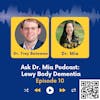Story of How I Became a Geriatrician

This episode I tell you the story of how I became a geriatrician and a couple who inspired me during my training. I use their example to talk about the 5M's of geriatrics: Mind, Mobility, Medications, Multi-complexity, and Matters Most. I also touch upon a reason why I think there are too few geriatricians.
More info about 5M's: https://www.healthinaging.org/tools-and-tips/tip-sheet-5ms-geriatrics.
Where to find age-friendly health systems that put the 5M's into practice: http://www.ihi.org/Engage/Initiatives/Age-Friendly-Health-Systems/Pages/default.aspx
Transcripts and submit questions to Dr. Mia and see transcription on www.miayangmd.com
Music & disclaimer
Transcripts on www.miayangmd.com.
Email: ask@miayangmd.com
Opinions expressed are exclusive of Dr. Mia Yang and not reflective of her or guest speaker's employers or funders.
Welcome back to second episode of Ask Dr. Mia podcast. I'm so excited that you're here. Today I am going to tell you about the story of how I decided to become a geriatrician. But before I get there, any patients that I share in my podcast, their names and identities have been changed for privacy.
Sometimes I may combine a couple of different patients into one composite patient, to provide privacy for those who are in my story.
When I was a second year internal medicine resident learning how to do house calls on a hot summer day in Baltimore. I was sitting in my red Honda Civic on the side of a bunch of row houses.
If you've been to Baltimore, you know what I'm talking about. These are very narrow, long houses that are right next to each other and in a block. My patient was inside one of these row houses, but I couldn't leave my car. At this point in my training, I had finished my intern year during which my paternal grandfather, my YieYie, who you have heard about from the first episode had passed away suddenly.
I went back to China for his funeral, during my intern year but didn't have enough time to process
what happened. But at the moment, when I was sitting in my car, gripping my steering wheel, I wasn't necessarily thinking about my grandfather at all. I was thinking. How am I going to get myself into this patient's home?
I was hit by overwhelming sense of anxiety and my heart was racing. My hands were sweaty. I started to cry because the thought in my head was "I just cannot do this". I didn't understand why I could not do this.
House calls are very intimate experiences for both the patient and the clinician. There's a lot that are uncomfortable and unfamiliar when we come out of the structure and the fluorescent lights of the examining room.
The homes are oftentimes cramped and cluttered with dark lighting, maybe unseasonably warm. Because a lot of homes in Baltimore did not have central air conditioning, they may have a window unit in their bedroom, but oftentimes I would see a patient in some other part of the house . I was thinking to myself, "gosh, I really think maybe I should become a geriatrician, but if I can't do house calls, Does that mean this isn't really not the field for me?" I also didn't know what I wanted to do. I was always someone who enjoyed all of the rotations and it was very difficult for me to pick just one.
All of these thoughts were swimming in my head. Meanwhile, I was still sitting in my car. I was already running late to my patient's home visit. I tried to get out of this by calling the House Call program coordinator. She didn't answer, probably stepped away to go to the bathroom. I tried to call my boyfriend at the time, who is now my husband, but he was working and he did not answer. I had to get myself together and wiped off my tears and went in to this patient's home.
I was there to see Pat. She was an 87 year old woman who has lived in Baltimore for 50 years with her husband of 57 years Bill. They had a lovely home near the water. They had a little dog named Coco and Coco would bark very loudly when I walk in., Bill was always someone who welcomed me with open arms. We would sit in his living room, checking in with each other, looking at the beautiful wedding pictures of their daughter, and discussing how Pat was actually doing. Pat had Alzheimer's disease and Bill was her constant companion. He took care of all the housework, did all the cooking, even though he really never cooked until she became too confused to cook. He managed all of her medicines. And of course, took care of all the financial Bills and doctor's appointments . They had, as common in many Baltimore homes, the bedroom and the bathroom were actually on the second floor. As Pat's illness progressed, she no longer could safely walk down the steps without falling. I went up the steps to see her in her bedroom. When I walk in to see Pat, Pat looked to Bill and said, "Daddy, who is this?" she didn't recognize that Bill was her husband.
Pat had a lot of medications next to her bedside table. 15, in fact. Bill had them lined up all right next to each other and he would take them out of each bottle every day to give it to her.
Some of these medications were diuretics because Pat also had heart failure. Some of these medications were for high blood pressure, diabetes. Bill tried to check her blood sugar but they were painful and Pat really didn't like it very much. Bill didn't want to cause her pain, so he rarely checked it despite having a blood sugar meter right next to her bed.
Pat also really liked eating ice cream and bacon, two things that were probably not the best for her high blood pressure and diabetes. But they brought so much joy to her. Whenever Bill gave in and gave it to her, she had no interest in eating any sort of heart healthy food.
Crab season was starting in Baltimore. For those of you who have been in Baltimore during crab season, that's usually when you would go to one of these crab restaurants and they would bring out a whole bucket of steamed crabs and lay brown paper on a table and give you a little hammer to break open the crab legs with a bunch of old bay seasoning. People will work through the old bay and drink a Natty Boh, the National Bohemian beer. Bill brought some crabs for Pat to eat at home because she really liked to eat crabs. On the day that I was seeing her, she had quite a lot of swelling in her legs. When I put my finger down on her shin, it left a pretty deep indentation. This is a sign to me that she's building up with fluid.
I got a scale from their bathroom and helped Pat stand on it. Turns out she had gained six pounds since the last time I saw her, which was only a month ago. She was feeling more fatigued and more tired and a little bit more short of breath. She really didn't walk a whole lot, so it was hard to know how short of breath she was when she was lying in bed.
Bill was noticing that she seemed to sleep better when he added a pillow to her back. So now she's sleeping on three pillows and instead of the usual two pillows. I was concerned that Pat was building up too much fluid and needed fluid pills to help her pee it out.
I instructed Bill to increase Pat's diuretic. I said that I would call back in a couple of days. I asked him to track her weight every day and to call me if he notices that she continues to gain weight.
It was surprising once I went into that home, all of my anxiety and uncertainty disappeared, focused on the task at hand and Bill and Pat. But once I left their home to return to the hospital, I arranged for a meeting with one of my program directors at the time. I told her how sad I have been and how anxious I have been. In the process of describing my panic attack before going in to see Pat and Bill, she was concerned enough to call the employee assistance services right there in her office, which was not what I wanted to do at all. I was hoping that she would say, this is all a part of your training and that you're just going to get better. Enjoy your weekend, sleep in, no big deal. Nope. She said you're going to go to counseling.
Despite my reluctance, I did because my mental health was moving in a direction that worried me. I was starting to have a hard time functioning at work. In second year residencies, when you start leading a team, when you teach the first year residents or interns, how to do their job. It really was a role that I was really looking forward to, but I really had no interest or energy to put into that at the time of that meeting with my associate program director. I was so glad, in retrospect, that she made that call that day and told me that I needed to go and take care of myself.
In the meantime, the diuretic change did not make any difference in terms of Pat. Unfortunately Bill called back in two days saying that she's really not making much urine. She's becoming more short of breath. She still has a lot of fluid in her legs. I told him to bring her to the hospital. She received IV diuretics, which sometimes people in heart failure need to help them get rid of the fluid. Our gut can become swollen just like Pat's legs , which limits absorption of oral diuretics. Although the hospitalization helped to get rid of the fluid that Pat accumulated, functionally after that hospitalization, she was never the same. She became more bedbound. She had a hard time even walking from her bedroom to the bathroom, which was only 10 feet away. She was starting to hallucinate a lot more. She became more confused in the hospital. She had a condition called delirium, which oftentimes happens to older adults and people with memory problems get worse when they get into an unfamiliar environment where their bodies and their minds are undergoing stress from the hospitalization.
Oftentimes the things that we the healthcare team do to her, having a catheter in her bladder, help track how much urine she was peeing, was uncomfortable for her. She tried to remove it. She did not sleep well in the hospital. She became much more confused. She started seeing people that were not there in her hospital room and lashing out at Bill, which were all incredibly distressing to Bill. In retrospect, I probably should have talked to him about their goals, his goals for her before that hospitalization. I wished that there was system in place where she could have received either outpatient IV diuretic, or IV diuretic in her home, but we did not have those services and that capability in place, at least not at the time that I saw her.
We did have a discussion about what matters most to him and to her. Bill told me that his most important goal is to help Pat stay in their own home. He wanted her to be comfortable. He saw that she had really declined after that hospitalization, even though the hospitalization treated her heart failure, treated the fluid that she had retained, she was never the same again.
He wanted her to enjoy eating ice cream and bacon, however much she wanted, even if that means she may not live for as long as possible. After that visit, we ended up deciding on home hospice, it seemed to be the most aligned to their goals. Pat passed away at a later point in my residency, but Bill and Pat have always stayed in my mind years later. Her story really encapsulate what we do in geriatrics. She had multiple chronic conditions, a very important one being dementia, which really influences her ability to self-manage all of her other chronic medical conditions. This is what's called multi- complexity. The complexity in geriatrics, not only deals with the different types of diseases or many diseases at the same time, but also deals with the function of a person, what they're able to do for themselves or not their lack of reserve and how easily what seemingly to be a minor setback, like a hospitalization, has turned into a permanent deterioration of her condition.
Oftentimes this is where people may also be discharged from the hospital to a skilled nursing facility for rehab. While that was not the case for Pat and Bill, sometimes a rehab setting can lead to improvement in one's function and they return home. But other times, people cycle back in through a hospitalization and a rehab and a hospitalization and a rehab, creating a vicious cycle. Geriatricians have training in rehab, long-term care, home care medicine, so we understand the limitations and the benefits of each setting.
Pat had 15 different medications. She had what we call polypharmacy, too many meds. Sometimes her meds worked against each other. As geriatricians, we try to reduce any unnecessary medications or medications that seem to have more side effects than benefits. In Pat's case, her diuretic for her heart was countering her chronic kidney disease. If you over -diurese, then her kidney function would decline.
She had mobility problems. She could not walk up and down the steps due to multiple reasons, both from the dementia, from deconditioning, from her arthritis. And the last one is her mind. There are actually two minds at stake in this story, both Pat's mind, which was plagued with Alzheimer's disease, but also Bill's mind. Bill at that point had been Pat's primary caregiver for years. He was exhausted. He was 89 years old himself. He had no time to go to see his own doctors because Pat constantly needed him. Their children were not close by. It was just the two of them. They fell into a very common category of being too rich for Medicaid, which is to insurance for the poor, but too poor to pay for private pay caregivers to help out Bill.
I knew that Bill was down and burnt out, even if he never said those words. He didn't like how he was becoming impatient with Pat. He knew that she could not help it. She could not help the fact that she constantly ask the same questions over and over. This is a story that unfortunately plays out for millions of families around the country.
While there is a lot that I personally could not change in Pat's life in Bill's life or in my patients' lives today, the framework of geriatrics has helped focus less on the individual diseases and how everything plays together, place out together. This is where the art of medicine really comes through.
The framework is the five M's: mind, mobility, medications, multi -complexity, and what matters most. Our goals and values and what would be living well for you really should drive all of the other decisions, all of the other M's. But oftentimes the healthcare teams never ask what is someone's most important goal.
Most older adults prioritized their independence and their function. They don't want to be a burden to their family or loved ones. But a lot of the things that we do in healthcare is focused on longevity, what can help you live for as long as possible, even if the burden of treatment may be more than what people would want. Some people would think that any extra days on earth, is a good day, but some people do not think that way. Toward the end of Pat's life, the goal has really changed into focusing on comfort.
Our goals could change at different times in our lives, but it's important that the clinician seeing the older adult and the older adult and their families are aligned on the same page. This also gets into one important reason why I think there are so few geriatricians. In the medical training process, we are never taught really how to process our emotions, how to process the grief that we take on. Our patients' problems sometimes become our problems even though we know intellectually that they are different from us. Most trainees were never given the opportunity to focus on their mental health, like I was given during my second year of residency. I know for certain that I would not have been able to choose the field of geriatrics, where everything is complex, medically socially, emotionally. I would not have been able to choose this field for myself if I didn't address my own grief and my own anxiety.
Too few trainees in our healthcare system ever get that opportunity. You can read about how geriatricians are not paid as much because reimbursement is mostly through Medicare. You can read about few people are exposed to geriatricians. But I think our natural human instinct to go for something that is clear and has a nice beginning and end really limits how many people choose to embrace the complexity, the messiness, and the beauty in that mess.
So I hope the story today help you understand that geriatricians are able to hold suffering and all the trials of aging lightly in their hand, like holding sand. When we try to resist that reality of aging we're creating additional suffering unnecessarily for ourselves. I also had to understand that while my actions matter as a clinician, I am not a savior. I cannot give my patients a whole new life.
It's those what seemingly opposite goals that really makes geriatrics beautiful specialty that embraces the gray.
If you've enjoyed this episode, please share it with people in your lives, leave me a review, or share on social media with the hashtag #AskDrMia.




























